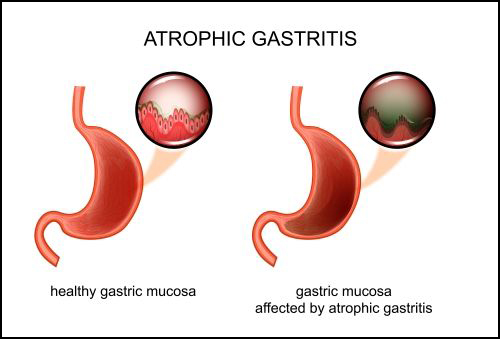Herbal Treatment of Atrophic Gastritis
Abstract
The stomach is a muscular, hollow organ in the digestive tract. It is located on the left side of the upper abdomen between oesophagus and small intestines. The stomach is the organ which receives food from the oesophagus. It is a sac-like expansion of the digestive system. The stomach serves as a temporary receptacle for food and water. This has a dilated structure and functions as a vital digestive organ. As we discussed before, what we eat is stored in our stomach. So it is very useful that what else we are eating is healthy and nutritious. Bad diet may lead to many stomach problems. So further in this article we are going to discuss one stomach disease that is Atrophic gastritis and its Ayurvedic management.
Introduction
Atrophic gastritis is the chronic inflammation of the stomach lining. This disease develops when the lining of the stomach has been inflamed for many years. This inflammation is the result of any bacterial infection, most commonly H. pylori. This bacteria disrupts the barrier of mucus that protects the lining of the stomach from acidic juices and it gradually destroys the lining of the stomach and causes inflammation. This condition slowly leads to a loss of gastric glandular cells. This further leads to the impaired functioning of hydrochloric acid, pepsin and intrinsic factors and causes atrophic gastritis.

Ayurvedic Aspect
We can correlate disease with Urdhva Amlapitta. “Amlam ch pittam amalpittam” this means acidification of gastric juices is amlapitta. Our Acharya said that this disease occurs due to the aggravation of pitta dosha. The main cause of this disease is Aama i.e. undigested food. This increases the level of gases in the stomach. Excessive intake of acidic and hot food items, excessive intake of alcohol, consumption of contaminated or spicy food, overeating, and taking toxic combinations are the causative factors for urdhva amlapitta. Due to these causes a person may experience yellowish, viscous and acidic vomitus, acid eructations, vomiting after or before meals, heartburn, burning in throat, headache, anorexia, fever, rashes and stomach pain. These are the causes and symptoms of the urdhva amlapitta as explained by Acharya Madhav.
Etiology/Causes
The most common cause of this disease is H.pylori bacterial infection. This bacterial infection most commonly occurs during childhood and gets worse over time. Recent studies also show that autoimmune metaplastic atrophic gastritis is the result of atrophic gastritis by attacking the parietal cells. In autoimmune conditions, our own cells mistakenly attack the stomach cells that are responsible for producing acidic juices that help in digestion. The patients of this disease are more prone to develop stomach cancers.
Clinical Features/Signs and Symptoms
Many patients are initially asymptomatic. However, if symptoms are appearing then those are:
- Stomach Pain
- Heartburn
- Loss of Appetite
- Unexpected Weight Loss
- Stomach Ulcers
- Iron Deficiency Anemia
- Weakness
Risk factors
The risk factors for developing this disease are:
- Areas of overcrowding and poverty
- Women are more prone to develop this disease
Diagnosis
A doctor will diagnose this condition by the combination of clinical observation and testing. A physician will go through the physical examination to diagnose the condition. Along with physical examination, some of the tests are also mandatory to diagnose this condition:
- Ultrasonography of abdomen
- CT scan (Computed tomography)
- Gastrointestinal Endoscopy
Ayurvedic treatment
In urdhva Amlapitta, the treatment protocol is:
- Firstly we have to avoid the causative factors of this disease as discussed above.
- In urdhva Amlapitta, we have to do Vaman (induced emesis) to pacify the vitiated kapha and pitta dosha.
Classical Ayurvedic formulations
Rasa
- Sutshekhar rasa
- Leela vilas ras
- Amlapittantak loha
- Kamdudha ras
- Shankh bhasma
- Praval pishti
- Praval panchamrit
Vati
- Paniya bhakta vati
- Soubhagya shunthi modak
Churna (Powder)
- Avipattikar churna
- Haritaki churna
- Triphala churna
- Mulethi churna
Kwath
- Panchatikta kwath
- Patoladi kwath
Ghrit
- Vasaghrit
- Shatavari ghrita
- Drakshadi ghrita
- Narayan ghrit
Some home remedies for atrophic gastritis
- Licorice
- Decoction of coriander, cumin and fennel
- Asafoetida
- Ginger
- Buttermilk
- Amla
- Mint leaves
Herbal remedies for atrophic gastritis
Planet Ayurveda offers very effective herbal formulation for various diseases. Basically this is a leading Ayurvedic firm which deals with the manufacturing of various herbal formulations. The herbal products are prepared by using potent herb extracts which are really effective in managing many conditions. The formulations do not contain any kind of adulterants, dyes, additives, fillers etc. The herbal remedy by Planet Ayurveda for the management of atrophic gastritis is:
- Mahashankh Vati
- Sanjivani Vati
- Avipattikar Churna
- Digesto plan Syrup
Products description
1. Mahashankh vati
This is a classical Ayurvedic formulation. This formulation is the best Ayurvedic medicine for stomach problems like indigestion, acidity, gastritis, pain, loss of appetite, etrc. This herbal formulation is made from the extracts of Pippali (Piper longum), Chitrak (Plumbago zeylanica), Danti (Bailospermum montanum), Sarjikakshara (natural sodium carbonate), Yavkshara (natural potassium carbonate). It is effective as a CNS stimulant. It is also effective in eliminating Aama (Endotoxins) from our body.
Dosage: 2 tablets twice a day before meals with plain water
2. Sanjivani Vati
This herbomineral formulation is the best and natural source for life and health. This is the classical ayurvedic formulation for Aama digestion that is effective in eliminating Aama (Endotoxins) from our body. This formulation is made from extracts of Vidanga (Embelia ribes), Sonth (Zingiber officinale), Pippali (Piper longum), Amalaki (Emblica officinalis), Haritaki (Terminalia chebula), Bibhitaki (Terminalia bellirica), Vacha (Acorus calamus), giloy (Tinospora cordifolia), Shuddha Bhallataka (Semecarpus anacardium), Shuddha Vatsanabha (Aconitum ferox). This helps in correcting the accumulated bacterial growth in the digestive gut.
Dosage: 1 tablet twice a day after meals with plain water
3. Avipattikar Churna
This Ayurvedic remedy is helpful in treating hyperacidity and constipation. It is a classical Ayurvedic formulation in powder form. This is prepared from potential herbs such as Pippali (Piper longum), Sonth (Zingiber officinale), Amalaki (Emblica officinalis) etc. These ingredients improve appetite, constipation and maintain healthy digestion. It also helps in acid reflux and chest discomfort. This herbal product maintains a healthy digestive system.
Dosage: ½ tsp twice daily with lukewarm water
4. Digesto Plan Syrup
This is a herbal remedy in syrup form. It improves the digestion naturally with the effective herbs such as Amalaki (Emblica officinalis), Haritaki (Terminalia chebula), and Bibhitaki (Terminalia bellerica), Ajwain (Trachyspermum ammi), Pippali (Piper longum), Saunf (Foeniculum vulgare), Shunthi (Zingiber officinale), etc. This helps in gas, bloating, acidity, irregular bowel movements, indigestion, gastritis etc. This syrup balances the toxins in the stomach and prevents Atrophic gastritis.
Dosage: 2 tsp twice daily after meals
Contact my assistant to provide you the costing / ordering and delivery information at – costing.planetayurveda@gmail.com or call at +91-172-5214030 Or Check Website – www.PlanetAyurveda.com
Conclusion
We concluded at last that this condition is caused by a bad lifestyle and contaminated or improper eating habits. This will slowly deteriorate the stomach lining and cause various stomach disorders. There are many antibiotic regimes available in allopathic medicines but longer duration may cause various other side effects also. So Ayurveda suggests some herbal formulations along with proper diet and lifestyle to manage this condition. So one must start with the herbal formulations of Planet Ayurveda to combat this disease. In case of any query kindly visit www.PlanetAyurveda.com






